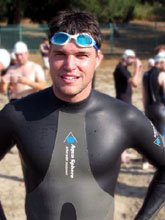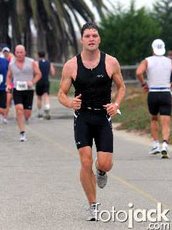Tell me if you haven't seen this at your local gym: a trainer who has every client perform every set of every exercise standing on some kind of unstable surface, one eye closed, perhaps juggling two balls in one hand and spinning three plates in the other. It doesn't matter whether the client is an overweight, middle-aged woman or a skinny fifteen-year-old boy, the guy looks like he's prepping his client pool to become an acrobatic troupe busking for handouts on the Santa Monica pier.
Ask any of these trainers what they’re doing and they'll tell you, with barely-disguised scorn for your tacky "dumbbells" and antiquated methods, "Oh, this is something called 'Functional Training.'"
The very name is polarizing, isn’t it? Like the terms "Pro-Life" and "Pro-Choice," the name implies that anyone who takes issue with your position must in turn be "pro" something abhorrent. Call your methods "functional" and you suggest that what everyone else is doing has nothing to do with the way the body functions. Which is, of course, absurd -- the body functions in a lot of different ways. "Functional" training emphasizes a handful of them, just as martial arts or racquetball or, for that matter, lying on the beach emphasize a handful of others.
Now, before I continue my hostile, one-sided rant, let me say that not all practitioners of functional training are as out to lunch as the hypothetical bonehead described above. Scroll down a few entries in this very blog and you’ll see my enthusiastic report on the Perform Better seminar, which was run by folks who call themselves functional training practitioners with well-deserved pride. But coaches like Mike Boyle, Gray Cook, and Eric Cressey analyze the physical functioning of their clients with expert scrutiny and base their exercise prescriptions on the specific needs of each athlete; they don’t just throw everyone on a Swiss ball and hope for the best.
Quick quiz: what more closely resembles something you actually do on a daily basis? Raising and lowering your body weight while standing with two feet on the floor -- i.e., squatting -- or lying supine on an inflated rubber ball, alternately pressing two medicine balls while keeping just one foot on the floor? Certainly, the first movement looks a lot more like something we do all the time: getting up out of a chair or a car seat, getting something out of a low cabinet, bending to pick up a child or a bag of groceries, heck, sitting your rump down on the toilet for a few contemplative minutes a day. By all rights the squat should be considered far more "functional" than the seated Swiss ball single-leg alternate medicine ball press, yet it's that second, patently absurd movement that would make the average gym-goer say "Now THAT'S functional training."
As if in order for a movement to have functional value it has to look like something you'd learn at clown college.
Look, I totally get stability balls, though I use them mostly for stretching and ab work. I get single-leg movements, though usually I use these moves in conjunction with conventional squats and deadlifts. My personal training certification forced me to learn so many stability moves that it makes me unstable just thinking about it. If I followed their system to the letter every client would practically have to walk a tightrope blindfolded before they could be trusted with anything so dangerous as a three-pound dumbbell. But why in the Sam Hill is the world of fitness so extreme that whenever an idea or a system either proves popular or has some actual merit or effectiveness -- as functional training admittedly does -- we get dogmatic and say, "Well, everything else must be pointless. Everything we’ve done up to this point is totally and completely wrong. We have to do everything standing on one foot, and once we can do that easily, we have to do it standing on a Bosu ball, then on a Swiss ball, and then on a Swiss ball on a Bosu ball on one foot."
Because for some reason that's functional.
I think what a fair number of otherwise smart people lose sight of while working from the "functional" angle is the fundamental question of WHICH function? In my snarky example above, what function is realistically being trained aside from the ability to perform that particular arcane exercise? For the person performing it, what carry-over will that movement realistically have outside the gym?
The sound idea behind functional training that's somehow gotten lost amongst Swiss balls and balance boards is that we should train movements that are as close as possible to movements that we encounter in everyday life. So adding a twist to an overhead press isn’t a bad idea, because I could picture, without too much effort, having to put an item on a high closet shelf and having to add a twist to get it in there just right. But I have to tie my mind in knots to figure out a life situation analogous to performing barbell curls while standing on a Bosu ball: bilateral butter-churning in an earthquake? Milking two inverted cows while standing on the fence between their pastures?
I sense some functional devotees poisoning their pens already, and I can hear it coming: instability challenges the nervous system, there's more proprioception (sensory feedback) to deal with, it's more challenging and more fun.
Well, regular old hardcore weight training challenges the nervous system as well. Smartypants strength coach Chad Waterbury is doing his best to educate the less gifted among us about that. More fun? Perhaps, for some people, but I'd postulate that the little bit of amusement that some people might get from imitating Cirque du Soleil performers comes at the expense of a lot of fat loss and muscle gain. Some resistance moves with an instability element added are indeed challenging, but the challenge is PRIMARILY going to be neural, not muscular. That is, the hardest part of doing the exercise will be keeping your balance, not lifting the weight, which means you're training yourself to be a better balancer, not a stronger person -- and not a significantly leaner person, either.
Now I'm all for balance work -- and for the fine-motor work that is another integral part of functional training as it's now defined -- but only if, and this is a big if, a person really needs them. My mother came down with a nasty case of the shingles a couple of years ago and had some trouble balancing for a while after that. A neurologist recommended she do some simple balance exercises -- which were essentially variations on some textbook functional training moves -- and they seem to have helped to clear things up. So functional training was valuable for her. Many older, deconditioned exercisers, people recovering from injuries, and those with severe muscular imbalances would be good candidates for this kind of work as well. But once good, healthy, pain-free, symmetrical movement patterns are established, and you no longer walk like Keith Richards coming home from Trader Vic's , it's time to put the Swiss balls away and get to work.
Andrew
PS: For anyone interested in receiving my monthly TIPS via email, shoot me a message here with "Add (your first and last name) to mailing list" in the subject line or go here and fill out the form at the bottom of the page. This is a free, convenient way of keeping up to date with me! Just be sure to continue checking back here every few days for regular blog updates, which I do NOT send out to subscribers -- they just sit here on this site, waiting patiently for you to sign on and read them. (Don't worry: I won't give your information out to anyone else!) Thanks for reading-- A
Tuesday, June 26, 2007
Call the Functional Training Abuse Hotline!
Subscribe to:
Post Comments (Atom)




3 comments:
The term 'functional' has lost all relevance to what function actually is. To me, function starts with strength no matter where you are going and the best way to get strong is to lift heavy weights.
Mate,
This is an absolutely awesome article. I could not of put it better myself. It is refreshing to see a fitness website where the trainer actually has a clue.
This is the first time i have been impressed with another trainers comments.
Brett Taylor
brett.taylor55@gmail.com
Who knows where to download XRumer 5.0 Palladium?
Help, please. All recommend this program to effectively advertise on the Internet, this is the best program!
Post a Comment